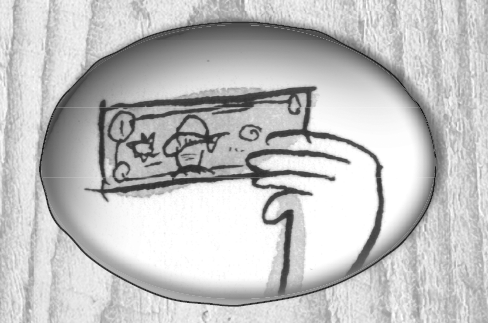
When the senators convened, Greenfin told them that there was nothing more he could do: the bank was simply out of fish. Some senators suggested that they tell the truth to the islanders. Those proposals died in committee. Lindy searched for better answers.
He asked the island's brilliant economist Brent Barnacle to take over at the bank.
"No problem, sir," said Barnacle. "The citizens have lost confidence. If we spend more of our Fish Reserve Notes now, we can restore that lost faith and the people will start spending for themselves. If I have to, I'll drop the Fish Reserve Notes from palm trees."
Some of the senators were a bit confused. Although none of them had Barnacle's economic training, some had the feeling that the problems stemmed from spending too much to begin with. Buddy Goldfish tried to talk some sense, but no one would listen.
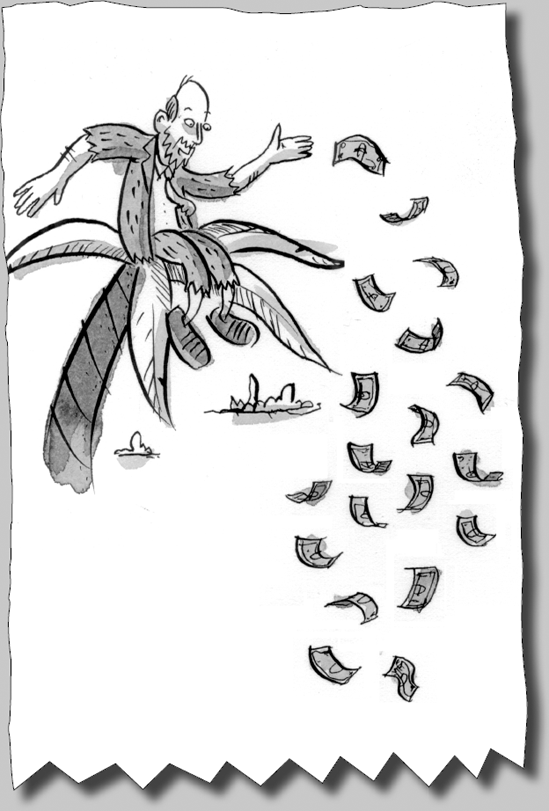

Fortunately, the tough choices were avoided by a neat twist of fate. Suddenly, the Senate door was flung open and one of the island's far-flung ambassadors, barged into the chamber with some very strange-looking people.

The ambassador had discovered an island across the eastern sea called Sinopia, where all the citizens still fished entirely by hand. Lacking the benefits of a free and developed economy, Sinopia struggled under the autocratic rule of an all-powerful king, who had subjected his people to whimsical experiments in social structure.
In Sinopia, all citizens were required to fish, but their catch did not belong to them. Instead fish were turned over to the king, who then decided which subjects deserved to get some back.
When the Sinopian king noticed that the diligence of some of the fishermen began to lag, he decreed that they all sing together patriotically while they fished. Those who forgot the words, or hit a sour note, would not be fed until they learned how to carry the tune.
Although this system did not produce much fish per capita, those in control did take a very significant portion of what was caught. So while the king and his court dined on ocean delicacies, the average Sinopian got by on half of a fish per day.
Much like Usonia before the first development of capital, Sinopia had no savings, no bank, no credit, and no business. From the Usonian perspective, the Sinopian economy was still stuck in the dark ages.
To his credit, the Sinopian king was savvy enough to realize that his island was going nowhere fast. Upon hearing the tales of Usonia, the king was impressed by the luxurious lifestyle of its citizens, as well as the island's advanced system of banking, credit, and commerce. He was determined to bring the same level of prosperity to his island.
After observing how the oceanwide economy functioned, the king surmised that possession of Fish Reserve Notes was the key to advancement.
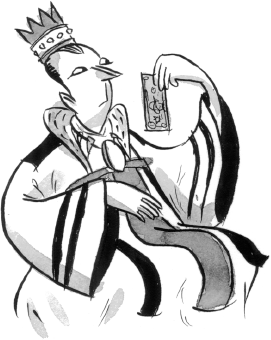
Indeed, he was aware that the notes were used as money across the entire ocean. The Bongobians accepted Fish Reserve Notes as payment for their bongos, and the Dervishers took them in exchange for their coconut oil products.

Sensing that the possession of the notes would allow his island greater access to the transoceanic economy, the Sinopian ambassador offered to exchange fish caught by his citizens for Fish Reserve Notes.
The senators looked at the Sinopians in disbelief. Then they looked at each other in giddy wonder. Could it be so easy? Access to fresh fish...in exchange for pieces of paper?
Without hesitation, Lindy B. stepped forward and agreed to their terms. Usonia would generously open the island's markets to Sinopian fish imports...and by the way, when could they start unloading the fish?
But before they drew up the paperwork, the Sinopian ambassador asked for reassurance that Fish Reserve Notes would always have real value.
"No worries," said Lindy B. "Anytime you want real fish for those notes, you just mosey up to our bank's fish window and we'll be happy to give you whatever you need. Just take a look around...does it look like we're short of fish?"
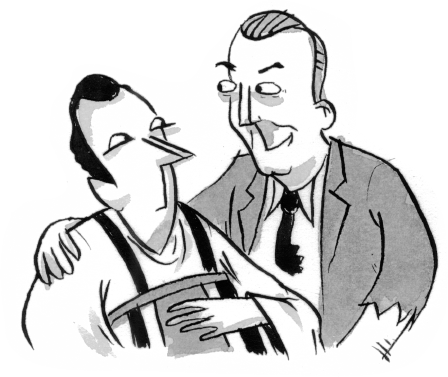
The treaty was signed and the Sinopian fish were delivered. In exchange, Lindy handed over a couple of stacks of freshly printed notes. Barely containing a chuckle he offered some parting advice, "Be careful with these, fellas. These things are very hard to come by."
Turning to the head banker, he said, "Hey Barnacle, let's get these fish over to the bank before we open for business."
The relieved bank president needed no convincing. "No problem, sir. I've got a team of fish technicians waiting in the vault. They're ready to slice and dice these babies as soon as they arrive. All the depositors will get their fish today. And unlike yesterday, there will be plenty of meat on the bones!"
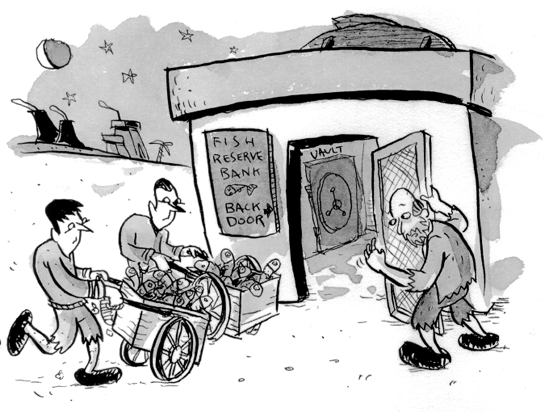
And so a new chapter in Usonia's economic history was born. Every day brought a new cargo canoe from Sinopia to make a deposit of fish, and every day the Sinopians got a new pile of Fish Reserve Notes in exchange.
The major question for the Sinopians was what to do with all the notes. The best thing would be to trade them for goods made by the Usonians. Of course, the Sinopians needed nets to increase their fishing efficiency, and Usonian manufacturers made the best nets in the ocean. So, the Able Net Company landed a massive order.
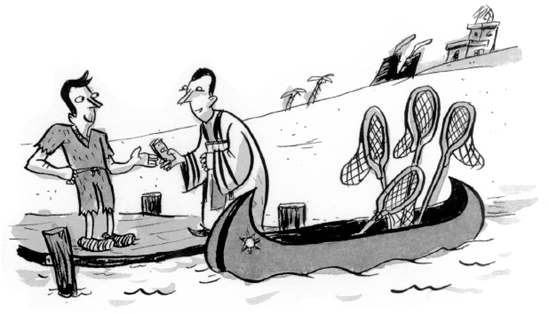
After all their buying, the Sinopians had some Fish Reserve Notes left over. Given the lack of a banking system in their home island, they decided to leave this trade surplus on deposit at the Fish Reserve Bank, where it would at least earn some interest.
The transactions were a huge boom to Usonia. Not only did the foreign demand boost the local economy, but deposits of Sinopian fish at the bank swelled the availability of credit. Even though the Usonians were spending more than they saved, there was still plenty of fish available to lend at low rates of interest.
With plenty of real fish to add meat to the bones of official fish, Usonia's problem of fishlation largely disappeared. With plumper fish, prices stopped rising and living standards rose once again.

In Sinopia things changed rapidly as well.
The Sinopian king belatedly realized the fatal flaw in his domestic economic model. His islanders simply would not fish if they had to give up all that they caught. Knowing this, the king made a dramatic reversal in policy when the nets came in from Usonia. Those who purchased nets from the king could keep all the extra fish they caught. Not surprisingly, this resulted in an increase in the Sinopians' daily fishing activities.
Sinopians wisely used their accumulated savings to invest in capital equipment and expand production. But the Sinopian entrepreneurs followed their King's direction and produced goods that could be sold for Fish Reserve Notes. Since Usonians had all the Notes, the new factories focused on things that the Usonians wanted.
With personal incentives finally in place, it didn't take long for the Sinopians to accumulate savings and expand production. As a result, Sinopian entrepreneurs were now able to build factories to make other goods, like spoons and bowls. And even though most Sinopians still lacked these things, they sold these goods back to Usonians, for, you guessed it, more Fish Reserve Notes.
For years, economists have mischaracterized the relationship between the United States and China. Most see it as a mutually beneficial system whereby the United States gets cheap products and cheap loans, and China gets manufacturing jobs. But is such an arrangement really a benefit for both parties?
The Americans do well: they get stuff without producing it and they get to borrow money without having to save. For their part, the Chinese get to work without consuming what they produce.
Where's the benefit there?
Most contemporary economic pundits also fail to appreciate the degree to which low interest rates in the United States are made possible by high savings rates abroad. Remember, in order to lend, someone has to save. Fortunately for the United States, the global economy allows these relationships to go beyond borders.
The trump card for the United States thus far has been the status of the U.S. dollar. As the world's official reserve, the dollar is accepted as the exchange currency for any international transaction. This means that everyone, not just the United States and its trading partners, needs dollars to conduct trade. So even if no one actually buys things that are made in this country, dollars are always in demand. No other country has this monetary good fortune.
Many of these dollars held by foreigners are typically deposited in American banks, where they can be borrowed by Americans. That way we can spend even if we don't save.
By holding their currency to a strict peg against the U.S. dollar, the Chinese authorities have essentially required that their citizens hold at least some of their savings in U.S. dollars.
Without these savings from China and other nations, everyone in the United States including the government would have a much more difficult time borrowing, and they would likely have to pay much higher interest rates for the privilege. High interest rates and scarce credit would be a lethal combination for our debt-fueled economy.
As current American leaders come into increasing conflict with China, this lifeline needs to be clearly understood, before it is callously cast adrift. Of course, since this relationship cannot last forever, the sooner it ends the less painful it will be, particularly for Americans. The longer you eat for free, the harder it is to feed yourself when the free food stops coming.
